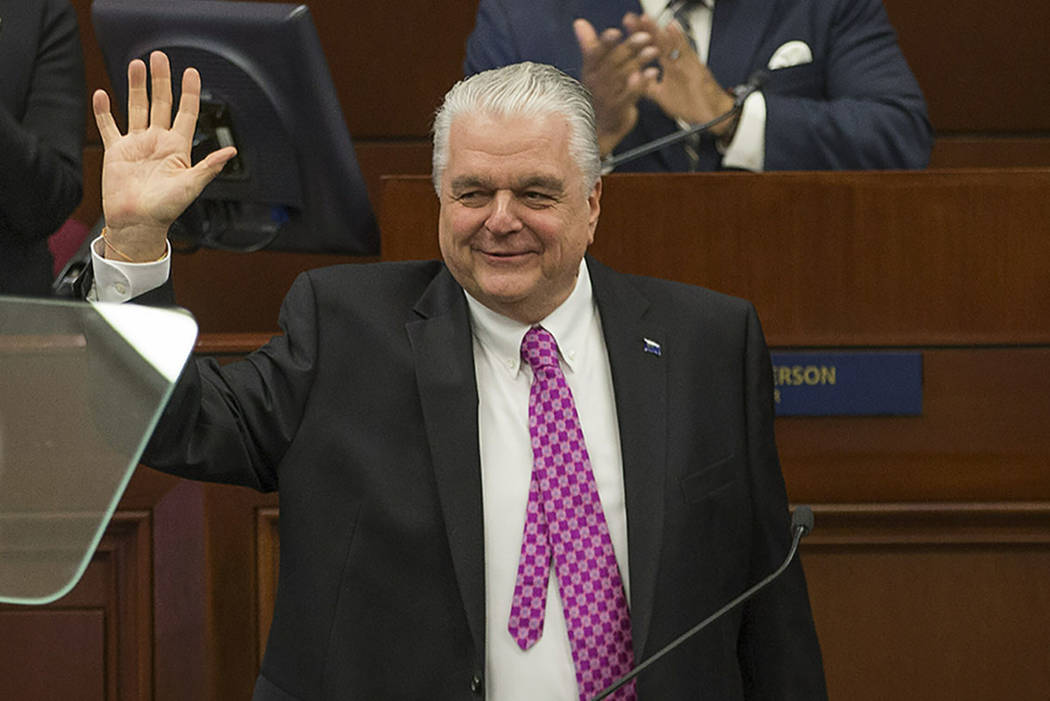Nevada Republicans say Sisolak tax renewal plan gives them leverage

CARSON CITY — Nevada Gov. Steve Sisolak fleshed out his spending requests Thursday with the release of an $8.9 billion proposed budget that puts the cost of teacher raises, one of his signature proposals, at $180 million over two years.
While pledging no new taxes in his State of the State address Wednesday night, the Democrat is proposing retention of two taxes that were scheduled to be reduced or phased out at the end of fiscal year June 30. Keeping them would generate $138 million over the two-year budget period that will start July 1.
But Republican lawmakers said Thursday that such an extension is a new tax in everything but name and would require a two-thirds majority vote of the Legislature. Democrats hold that supermajority in the 42-seat Assembly but are one vote short of it in the 21-member Senate.
“When a tax expires and you renew it, I think the N-E-W part of that means it’s new,” said Assembly Minority Leader Jim Wheeler, R-Gardnerville. “Unless they can make some kind of deal with the Senate on that side, I believe it will fail.”
The state’s modified business tax was slated for a reduction June 30. Retaining it through June 2021 would generate $48 million a year. Similarly, Sisolak wants to keep a portion of the governmental services tax that was scheduled to sunset in June. The tax, paid by vehicle registration, is based on the vehicle’s value. Keeping the tax as is would generate an additional $21 million annually.
The administration is assessing what the required voting threshold is for extending the taxes. A clearer case exists for a two-thirds threshold for the business tax, but the government services tax might qualify for extension by simple majority.
Republican lawmakers don’t see a distinction.
“It’s a new tax. They’re reauthorizing a new tax,” said Senate Minority Leader James Settelmeyer, R-Minden. “If it was not a new tax, we wouldn’t need to vote on it.”
When asked about the proposed tax extensions Wednesday night after his speech, Sisolak instead highlighted the programs his budget would fund, including more spending for education, mental health programs, prison and juvenile justice reform and expanded social services such as Meals on Wheels for seniors.
“I said no new taxes, and there are no new taxes in the budget,” he said. “We are not proposing any new taxes.”
Settelmeyer did not reject the proposed tax extensions out of hand and said lawmakers will “have those (spending) discussions with Gov. Sisolak and we’ll see what it occurs.” The Legislature convenes Feb. 4.
The two tax changes are Sisolak’s only departures from the state revenue projections finalized in December, and his budget retains substantial portions of what former Gov. Brian Sandoval proposed before leaving office. Sandoval had committed to a salary increase for state and higher education employees but had not set a rate. Sisolak on Wednesday announced a 3 percent increase for all employee groups.
That increase for roughly 26,500 K-12 teachers and other employees comes in addition to the 2 percent annual merit pay increases they receive. It is the first such increase since 2007 and is projected to cost roughly $90 million a year.
Sisolak’s budget also forecasts K-12 enrollment growth of 1.3 percent annually at a cost of $45 million the first year and $82 million the second. Rising health insurance costs of 4 percent annually will total $33 million over the two years. Overall, basic per pupil expenditures will increase 3.7 percent over the two years, from $5,897 to $6,116, according to the budget.
The overall two-year funding increase for K-12 and higher education is $602 million. That figure includes funding from local and federal sources.
The state’s general fund budget is approximately 35 percent of all funds expended; 39 percent of total spending is federal money. The general fund budget is supported by taxes: 30 percent is sales tax, 18 percent is gaming taxes, and 16 percent is business taxes.
Other highlights of the governor’s two-year budget include:
— An increase in K-12 funding from $36 million to $70 million annually, with a weighted funding model to help struggling students regardless of income or location.
— $45 million for pre-K programs, two-thirds of it to offset a loss of federal grants.
— A $2 million increase over two years for K-12 career and technical education, to $27 million, to serve an additional 2,000 students.
— An 80 percent increase in teaching supply reimbursements, to $4.5 million annually, raising individual teacher reimbursements from $100 to $180 a year.
— $22 million per year for enrollment growth in higher education, a $77 million health and sciences building at the College of Southern Nevada and a $62 million education building at Nevada State College.
— A $14 million increase for the UNLV medical school over the two-year base funding of $10.6 million.
— $132.4 million over two years for Medicaid and check-up programs to cover declining federal cost coverage.
— $107 million over two years to fund a 5.4 percent increase in Medicaid caseloads, to approximately 687,000.
— $10.7 million in Medicaid waivers, generating $39.5 million in federal funds, for tenant support and behavioral health.
— $9.8 million in increased Medicaid rates for neonatal and pediatric intensive care.
— $823,000 annually for the Meals on Wheels program for seniors to increase per-meal funding by 50 cents and eliminate the waiting list.
— $5.3 million in state and federal funding over two years to cut the waiting list for autism treatment and assistance programs, and $3 million annually in state money for enhanced family planning.
— $13.9 million to move the state’s health insurance exchange under the Affordable Care Act off the federal platform.
—$10 million in state tax credits annually, starting next year, for creating or preserving affordable housing.
Contact Bill Dentzer at bdentzer@reviewjournal.com or 775-461-0661. Follow @DentzerNews on Twitter.
Gov. Sisolak's budget l… by on Scribd














